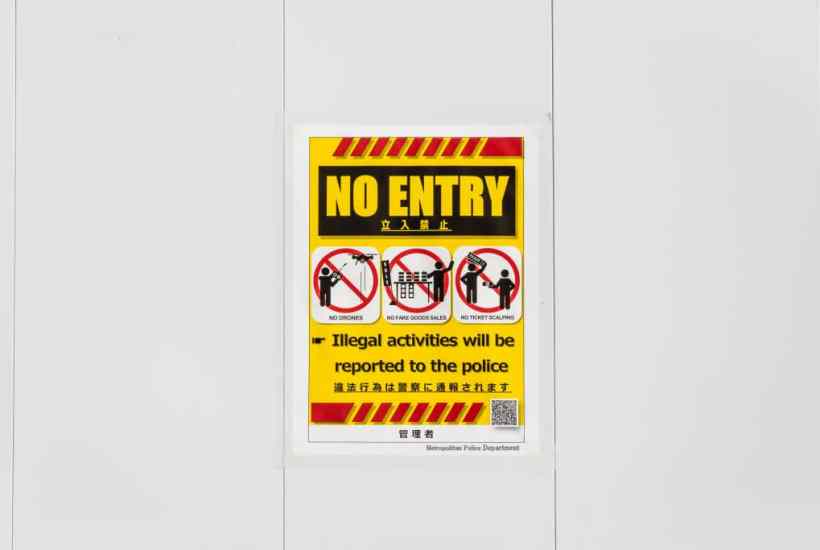A colleague has posted on the ‘Return to Japan’ Facebook page that his hotel quarantine at Tokyo’s Narita airport is set to be extended by ‘at least a week’. This is after testing positive with symptomless Covid on the point of his supposed release. He’s already spent six days locked up in a tiny room with nothing but cold bentos (lunch boxes) for food. He now faces at least another week staring at the wall, worrying about whether his job will still be open when he finally emerges.
In a sense my colleague is lucky. Thanks to his work visa, he will at least be allowed back into the country once he has established his non-Covid status. For many foreigners hoping to enter Japan, the borders remain firmly closed. In January, prime minster Fumio Kishida extended the entry ban on most non-resident foreigners until the end of February. Foreign students, businesspeople, and tourists, remain locked out.
Expats are incensed by the perceived injustice of a system that appears to be based on nationality and takes no account of vaccination statues, and little of Covid prevalence at point of departure. A body representing foreigners separated from stranded family members hoping to visit submitted a 12,000-signature petition to foreign minister Yoshimasa Hayashi at the end of January. American journalist Jake Adelstein tweeted that ‘Cool Japan has become Cruel Japan’. He called the restrictions ‘xenophobic, unscientific and mean spirited’.
Is Adelstein correct? He had a chance to press his case during a Q and A with Tokyo governor Yuriko Koike at the Foreign Correspondents’ Club in Tokyo. He accused the governor of supporting a quasi-xenophobic immigration policy. The governor ignored the attack and merely noted that other countries have imposed stringent immigration rules in the wake of the emergence of Omicron. She then rehashed her mantra that the best defense is to get vaccinated, wear a mask and wash your hands.
Koike seemed unconcerned by the distress and inconvenience the restrictions have caused foreigners who call Japan home. But then she is an astute politician, and the measures certainly appear to be popular domestically. A poll in December soon after Kishida assumed office found nine in ten Japanese people favoured the ban on foreign entrants to the country.
There has been talk of a Covid-induced revival of the ‘Sakoku spirit’ a reference to the 214-year period when Japan was almost entirely closed off to the world. Far from a source of embarrassment to the Japanese this period is still seen a something of a Golden Age. It is regularly portrayed in TV dramas and films, much like the Victorian era is in the UK. For many people here, it is viewed as a time when the country’s unique characteristics seemed to be at their most salient, and when the country was most clearly itself.
Perhaps there is a simpler explanation though. Just as the UK’s government is seen by some to have panicked and introduced various lockdown measures during the pandemic, so the inexperienced Kishida administration reacted impetuously in December. The knee-jerk border closure was clearly an attempt to look decisive in contrast to the reputedly slow-paced previous administration of former PM Yoshihide Suga.
But the implications of the blanket ban weren’t thought through and it is proving difficult to unravel. With large numbers of new Omicron cases still being reported and a ‘quasi state of emergency’ having been declared in response, to row back now – with limited progress having been made – would seem like an admission of failure.
But the pressure is growing on Kishida to budge, and not just from expats. The powerful business lobby group the Keidanren has called the policy unrealistic and self-defeating. And on Thursday the president of All Nippon Airways Yuji Hirako echoed this appeal, outlining the damage it is doing, not only to the aviation industry but to the wider economy. As Robert Dujarric noted in Nikkei Asia the longer the restrictions are in place, the more foreign students, investors and entrepreneurs will simply give up and go elsewhere.
As for my colleague, hopefully he will be released soon. Many people in Japan expect the airport quarantine system (paid for by the Japanese taxpayer) will be gone by March or April, assuming a new variant doesn’t emerge. But by then, the damage caused by Japan’s draconian border measures will be difficult to undo.
Got something to add? Join the discussion and comment below.
Get 10 issues for just $10
Subscribe to The Spectator Australia today for the next 10 magazine issues, plus full online access, for just $10.



















Comments
Don't miss out
Join the conversation with other Spectator Australia readers. Subscribe to leave a comment.
SUBSCRIBEAlready a subscriber? Log in